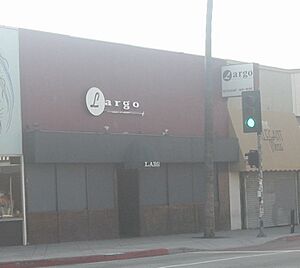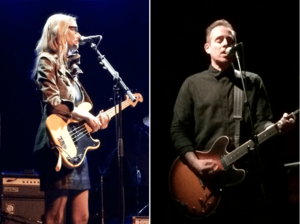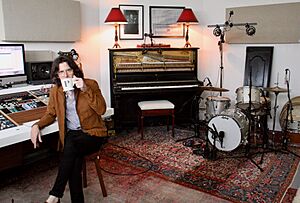Aimee Mann facts for kids
Quick facts for kids
Aimee Mann
|
|
|---|---|

Mann in 2008
|
|
| Background information | |
| Birth name | Aimee Elizabeth Mann |
| Born | September 8, 1960 Richmond, Virginia, U.S. |
| Genres | Alternative rock |
| Occupations |
|
| Instruments |
|
| Years active | 1980–present |
| Labels |
|
Aimee Elizabeth Mann (born September 8, 1960) is an American singer and songwriter. For over forty years, she has released many albums as a solo artist. She is known for her clever and thoughtful songs about people who might feel a bit lost or left out. Her work with producer Jon Brion in the 1990s was very important for American alternative rock music.
Mann was born in Richmond, Virginia, and later studied music in Boston, Massachusetts. In the 1980s, she helped start the new wave band 'Til Tuesday. She wrote their popular song "Voices Carry" (1985). 'Til Tuesday released three albums. The band broke up in 1990 when Mann decided to start her own solo career.
Mann's first two solo albums, Whatever (1993) and I'm with Stupid (1995), received good reviews but didn't sell many copies. This led to disagreements with her record company, Geffen. She became more widely known for her songs on the soundtrack for the film Magnolia (1999). Her song "Save Me" was nominated for an Academy Award for Best Original Song and a Grammy Award. Mann left Geffen and released her third album, Bachelor No. 2, on her own record label, SuperEgo Records, in 2000. This album was praised and sold well. It showed that Mann could be a successful artist who could release music independently.
In 2014, Mann released an album with Ted Leo as the Both. Mann also enjoys painting and making comics. She has appeared in films and TV shows like The Big Lebowski, Buffy the Vampire Slayer, Steven Universe, The West Wing, and Portlandia. She has won two Grammy Awards, including Best Folk Album for Mental Illness (2017). Both NPR and Paste magazine have called her one of the greatest living songwriters.
Contents
- Early Life and Music Beginnings
- Music Career Highlights
- Songwriting Style
- Personal Life
- Discography
- Awards and Nominations
- See also
Early Life and Music Beginnings
Growing Up in Virginia
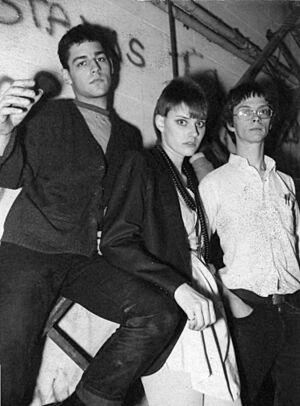
Aimee Mann was born in Richmond, Virginia, on September 8, 1960. When she was three, her parents divorced. Her mother took her to Europe, but her father hired a detective to bring her back to England a year later. She then lived with her father, stepmother, and two stepbrothers. Mann later said her father seemed "like a stranger" when they met again. This experience made her feel anxious about traveling later in life. She didn't see her mother again until she was 14.
Mann grew up in Bon Air, Virginia, and went to Midlothian High School. She was a quiet and thoughtful child. Her drama teacher remembered her as "insecure" but worth listening to when she did speak. Mann learned to play her brother's guitar when she was sick in bed at age 12. As a teenager, she liked David Bowie and Iggy Pop. She was inspired by punk and new wave music. She felt these music styles allowed artists to be creative and do whatever they wanted.
Starting Her Music Career
In 1978, Mann felt she didn't fit into a "normal world." She enrolled in Berklee College of Music in Boston to study bass guitar. She had wanted to learn bass as a child, but her family thought it wasn't suitable for girls. After 18 months, she left college and joined the Boston punk band the Young Snakes as their bassist. She didn't enjoy being in the band because they didn't like her writing melodic songs or love songs. She then joined the band Ministry, which helped her learn to write songs more effectively. In the early 1980s, she also worked at a music store called Newbury Comics in Massachusetts.
Music Career Highlights
1980s: Success with 'Til Tuesday
While at Berklee, Mann formed a new wave band called 'Til Tuesday. She played bass and sang vocals. They signed with Epic Records and released their first album, Voices Carry, in 1985. The song "Voices Carry" became a top-ten hit and won an MTV Video Music Award for Best New Artist. Mann said "Voices Carry" was one of the first songs she wrote. It showed her skill for telling stories about different people, not just typical love songs. The song's success made Mann an early female star on MTV. The Washington Post described her as a popular new wave star with a unique look.
'Til Tuesday released their second album, Welcome Home, in 1986. Mann also sang with Geddy Lee on the 1987 song "Time Stand Still" by the band Rush. 'Til Tuesday released their third and final album, Everything's Different Now, in 1988. The songs on this album were influenced by Mann's breakup with singer-songwriter Jules Shear. The album showed how much Mann's songwriting had grown. It included a song she wrote with Elvis Costello. Everything's Different Now didn't sell well. Mann said Epic Records stopped supporting it after staff changes.
'Til Tuesday broke up in 1990 when Mann decided to start her solo career. She later explained that her musical interests had changed. She was more interested in acoustic guitar music than the new wave pop of 'Til Tuesday. Michael Hausman, the 'Til Tuesday drummer and Mann's former boyfriend, became her manager. Epic Records kept Mann under contract for three more years, which stopped her from releasing new music. This was one of several disagreements Mann had with record companies. Hausman said these experiences made her careful about how she worked with them.
1990s: Solo Albums and Film Music
Early Solo Work
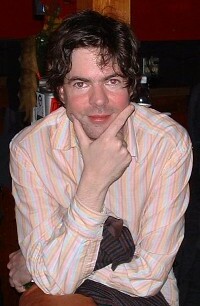
Mann recorded her first solo albums with producer Jon Brion. Brion had been a touring musician for 'Til Tuesday. Mann found working with Brion exciting, and she felt her songwriting improved with him. Together, they created a sound that was called "LA alternative." Mann's first solo album, Whatever, came out in 1993 on the independent label Imago. It received good reviews but didn't sell as many copies as hoped. In 1994, Mann moved to Los Angeles. She also toured with the British band Squeeze, playing her own songs and theirs.
After Mann finished her second album, I'm with Stupid, Imago Records had money problems and delayed its release. Imago eventually sold the album to Geffen, which signed Mann in 1994 and released I'm with Stupid in 1995. Even though Mann's solo albums showed she was a clever and confident songwriter, her sales were still low. She began to be thought of as an artist from the 1980s. Dick Wingate, who signed 'Til Tuesday to Epic, said Mann had a tough time in the music business. He added that disappointment and bad luck made her distrustful of record labels.
Film Contributions and Magnolia
Mann recorded a cover of "One" by Harry Nilsson for a 1995 tribute album. She wrote "Wise Up" for the 1996 film Jerry Maguire, but the director felt it didn't fit. It was still included on the Jerry Maguire soundtrack. In 1997, Mann covered "Nobody Does It Better" for an album of James Bond theme songs. Mann's song "Amateur" was used in the film Sliding Doors. She also made a small appearance in the film The Big Lebowski in 1998.
Later in the 1990s, Mann often performed at Largo, a club in Los Angeles. This club featured alternative songwriters like Brion, Elliott Smith, Fiona Apple, and Rufus Wainwright. Performing at Largo helped shape Mann's songwriting. The club fit her so well that the owner jokingly called it "Aimee Mann's clubhouse."
Mann became more widely recognized after she contributed songs to the 1999 film Magnolia. These included "One," "Wise Up," and songs she was writing for her third album. Two songs, "Save Me" and "You Do," were written specifically for the film. Magnolia even uses lines from Mann's lyrics in its dialogue. The director, Paul Thomas Anderson, said he "sat down to write an adaptation of Aimee Mann songs."
The Magnolia soundtrack sold very well. "Save Me" was nominated for a Grammy Award and an Academy Award. Mann performed it at the 72nd Academy Awards. In 2021, the Los Angeles Times called "Save Me" Mann's best work, saying it "solidified Mann's stature as an esteemed songwriter." In 2022, Pitchfork named it among the best songs of the 1990s. Mann later said the song "really gave a blood transfusion to my career." The success of the Magnolia soundtrack also caused Mann stress, as she felt pressure to tour a lot.
1999–2001: Bachelor No. 2 and Independence
Mann took more control over making her third album, Bachelor No. 2. It included her second song written with Elvis Costello. Geffen Records refused to release the album, believing it had no hit songs. In response, Mann sold homemade versions of her new music while on tour in 1999. She called this a "DIY" (Do It Yourself) move to show she could sell her music herself. She accepted an offer from Geffen to leave her contract, deciding to be "in charge of her own destiny."
In 1999, Mann and Hausman started their own label, SuperEgo Records. With Mann's husband, songwriter Michael Penn, they also created United Musicians. This was a group of artists working outside the big record label system. Using money from Magnolia royalties, Mann bought the Bachelor No. 2 recordings from Geffen. She sold 25,000 copies of the album through mail order from her website, which was a lot for an independent artist. After getting a distribution deal, Bachelor No. 2 sold 270,000 copies, selling more than I'm with Stupid. Bachelor No. 2 became one of the best-reviewed albums of the decade. Its success showed Mann could be a successful artist working outside the major record labels.
In 2000, Mann, Penn, and comedian Patton Oswalt performed together on the Acoustic Vaudeville tour. In 2001, Mann sued Universal Music over a greatest-hits album they released without her permission. She felt it was "substandard and misleading." The Boston Globe said this lawsuit was one of several challenges to major labels by female musicians that year. That year, Mann was a judge at the first Independent Music Awards, which promotes independent musicians. She judged the awards again in 2011.
2002–2007: Lost in Space and The Forgotten Arm
After the success of Magnolia and Bachelor No. 2, Mann went through a difficult time with depression. In 2002, she went to a rehabilitation center for anxiety and depression.
Mann hinted at her health problems in her fourth album, Lost in Space, released in August 2002. Paste magazine described it as "another marvelous collection of Mann's intimate portraits of lost love and broken people."
In November 2004, Mann released Live at St. Ann's Warehouse, a live album recorded in Brooklyn, New York City. That year, she appeared in the TV series Buffy the Vampire Slayer, performing two songs. She also appeared on The West Wing, singing a cover of James Taylor's "Shed a Little Light." Mann sang on "That's Me Trying" from William Shatner's 2004 album Has Been.

In May 2005, Mann released The Forgotten Arm. This was a concept album set in the 1970s about two lovers on the run. It was produced by Joe Henry and mostly recorded live in the studio. The album's artwork won a Grammy Award for Best Recording Package. While The Forgotten Arm received good reviews, some felt Mann's work was becoming too similar.
In October 2006, Mann released One More Drifter in the Snow, a Christmas album with covers and new songs. This was the first of several albums produced by Mann's bassist, Paul Bryan. Mann said she didn't like modern Christmas songs. Instead, she was inspired by classic Christmas records from artists like Bing Crosby and Frank Sinatra.
That year, Mann started an annual tradition of playing Christmas shows that combined music and comedy. Guests have included Oswalt, Jeff Goldblum, and Grant-Lee Phillips. Mann described it as a "Christmas show for people who don't really like Christmas." In 2007, Mann contributed two original songs to the soundtrack for the film Arctic Tale. She also sang on "Unforgiven" from John Doe's album A Year in the Wilderness.
2008–2012: @#%&*! Smilers and Charmer
In June 2008, Mann released her seventh album, @#%&*! Smilers. This album featured less electric guitar and more keyboards. It reached number 32 on the Billboard 200 chart. @#%&*! Smilers received mostly good reviews. AllMusic wrote that it "pops with color" and has "big pop hooks." The album's artwork was nominated for a Grammy Award.
In May 2011, Mann performed for President Barack Obama and Michelle Obama at the White House. She also appeared in a sketch for the TV series Portlandia. Mann played herself as a cleaner, explaining she needed the second job to support herself.
In 2012, Mann released her eighth solo album, Charmer. The songs on this album were about how personal charm shouldn't always be trusted. Two singles were released: "Charmer" and "Labrador." The music video for "Labrador" featured actor Jon Hamm and referenced Mann's old music videos with 'Til Tuesday. In the same year, Mann sang on Steve Vai's album The Story of Light. She also recorded "Two Horses" for the film Tim and Eric's Billion Dollar Movie. Mann sang backing vocals on the 2013 Heidecker & Wood album Some Things Never Stay the Same.
2013–2019: The Both and Mental Illness
In 2013, Mann appeared on the Ivan & Alyosha album All the Times We Had. In February, she and Ted Leo formed a duo called the Both. They performed shows in Los Angeles and San Francisco. They released an album on SuperEgo in April 2014. Spin magazine called it "the best thing either artist has ever done." On July 22, Mann sued MediaNet, saying they were distributing 120 of her songs without a valid license. She settled the lawsuit out of court in 2015.
In February 2014, Mann voiced a female warrior named Opal in the animated series Steven Universe. She returned to this role for Steven Universe: The Movie (2019), performing the song "Independent Together" with Leo. Mann sang a version of Styx's "Come Sail Away" for a 2014 episode of the TV show Community. In 2015, Mann and Leo appeared on the talk show Conan to perform a song supporting a 2016 US presidential candidate. Mann covered the 1973 Carpenters song "Yesterday Once More" for a 2016 episode of the HBO drama Vinyl. In October 2016, Mann released the song "Can't You Tell" as part of a campaign protesting the presidential campaign of Donald Trump.
In March 2017, Mann released her ninth solo album, Mental Illness. This album featured simple acoustic songs and collaborations with songwriters Jonathan Coulton and John Roderick. A friend suggested the title. Mann said it was a "bald, accurate and funny" way to describe the themes in her songs. Mental Illness won the Grammy Award for Best Folk Album at the 60th Annual Grammy Awards. Coulton joined Mann for some performances on the Mental Illness tour.
That September, Mann contributed the song "Everybody Bleeds" to an episode of the Netflix series Big Mouth. In January 2018, Mann appeared in an episode of the FX series The Assassination of Gianni Versace: American Crime Story as a bar singer, performing the 1984 Cars song "Drive". She also appeared in the sitcom Corporate. In 2019, Mann released a special 20th-anniversary edition of Bachelor No. 2. She also hosted a podcast with Leo, The Art of Process, where they interviewed celebrities.
2020s: Queens of the Summer Hotel and Artwork

In 2020, Mann wrote a song, "Big Deal," for the animated series Central Park. On November 5, 2021, Mann released her tenth album, Queens of the Summer Hotel. The songs on this album were inspired by Girl, Interrupted, a 1993 book about a young woman's time in a psychiatric hospital. Mann had developed these songs for a musical based on the book, but it was canceled due to the COVID-19 pandemic.
In January 2022, Mann started sharing autobiographical comics on Instagram. She said making comics was similar to songwriting. She found it a "weird, lonely, insular" activity, unlike the group effort of music. In 2025, Mann said she was working on a graphic memoir, which is expected to take several years.
In April 2022, Mann showed her paintings, You Could Have Been a Roosevelt, at City Winery in Manhattan. The paintings are portraits of "the ten worst US presidents" and some first ladies. Mann created them after promising her friend, politician Antony Blinken, a painting for his White House office. She joked that Blinken "declined to have a portrait of Millard Fillmore on his wall." On May 22, Mann led a group of women performers at the Novo club in Los Angeles to raise money for the Magee Women's Institute.
Mann was removed from a supporting role on Steely Dan's 2022 tour. Donald Fagen, a co-founder of Steely Dan, said it wasn't because she was a female singer-songwriter. He said Mann wasn't a good musical fit. He apologized, saying he respected Mann and didn't realize she had been announced for the tour. Mann accepted the apology. She covered the Steely Dan song "Brooklyn (Owes the Charmer Under Me)" on tour that year.
In January 2023, Mann launched an Audible podcast called Straw into Gold. In it, she interviewed artists about the connection between art and difficult experiences. In January 2025, she organized a fundraiser for her longtime producer, Paul Bryan, who lost his home and recording studio in the Palisades Fire. On March 6, Mann announced a new remastered version of Lost in Space, with a US anniversary tour starting in June. On May 17, Mann reunited with 'Til Tuesday for their first show in 33 years at the Cruel World Festival in Pasadena. Mann said she enjoyed preparing for the performance and had to relearn how to sing the songs because her style had changed. Mann sang on "Alabaster" by the English duo Flyte, released in July.
Songwriting Style
Pitchfork magazine described Mann's music as "refined guitar pop filled with attuned details and characters more often associated with the best short stories." The journalist Jon Pareles called Mann a "formalist of pop songwriting" whose songs have clear structures and melodies. The New York Times critic Ben Ratliff wrote about Mann's "clever pop songs, rich in melody and full of well-known sayings." Mann said songwriting was "an exercise in order... To attempt to describe something — to make connections, to put pieces together, to try to sum up complicated ideas in a three-and-a-half minute song — that's trying to put chaos in order for me."
Mann played the bass guitar with the Young Snakes, 'Til Tuesday, and the Both. For her own shows, she usually plays acoustic guitar because it's "more convenient." On her first solo albums, Mann and producer Jon Brion created a sound called "LA alternative." This style is linked to other alternative artists from that time, like Fiona Apple and Elliott Smith, who also worked with Brion. Several of Mann's later albums were produced by Paul Bryan.
In the 1990s, Mann's record company, Geffen, pressured her to write hit songs, which she found frustrating. When she tried to write catchy and easy-to-understand songs, she got bored and couldn't finish them. She felt that record companies tried to "remove everything that's interesting" from her songs. She decided that her music wouldn't sell to a huge audience, so it was better to keep it true to herself. Mann said she wasn't interested in being a pop star. She felt she didn't have the special skills needed for huge stardom.
In 2000, Nick Hornby wrote in New Yorker that Mann was a "fine, occasionally brilliant singer-songwriter, nothing more, nothing less." He said her straightforward approach had cost her success. He felt she didn't fit the expectations for female singer-songwriters. She wasn't like the "lads" such as Sheryl Crow, nor was she as open about her pain as artists like Tori Amos.
In 2006, Paste named Mann the 54th-greatest living songwriter. NPR named her among the ten greatest living songwriters. Robin Hilton of NPR wrote that she was "vastly underrated" and had "a real gift for piercing the heart of something, revealing instead of telling and wrapping it all up in inspired melodies."
Song Lyrics
Mann is known for her sharp and clever lyrics. She likes precise lyrics and rhymes that are "perfect and interesting." She explores serious topics and writes about characters who are lost, lonely, or don't quite fit in. In Pitchfork, Chris Dahlen wrote about Mann's skill in writing about serious subjects without feeling sorry for herself. He noted how she uses specific images to convey general meanings. Another Pitchfork writer, Eric Torres, said Mann's focus on "underdog" characters might come from her struggles in the music industry. In Paste, Dave Sims wrote that Mann's main characters often find themselves in difficult relationships.
Mann often combines sad music and themes with funny or sarcastic lyrics. This creates a feeling that the narrator is trying to hide their true feelings. She felt this was sadder than just stating the feelings directly. She said: "I'm sure I'm the only person who thinks any lines or any moments are funny, but that's usually because they're the most accurate and bleak ones." In the New York Times, Nate Chinen wrote that "the sugarcoated poison pill is a reliable device for Aimee Mann." Paul Thomas Anderson wrote that Mann was "the great articulator of the biggest things we think about: 'How can anyone love me?' 'Why the hell would anyone love me?' and the old favorite 'Why would I love anyone when all it means is torture?'"
Many of the lyrics on Mann's 1990s albums expressed her frustration with her record label, Geffen. Hornby noted that some people found Mann's "self-righteous sense of grievance" annoying. Hornby responded that pop music can express any mood and asked: "Who doesn't feel like whining sometimes?"
Musical Influences
Mann said she was mainly influenced by "classic" 1970s chord progressions and melodies. Elton John was the most important artist to her when she was young. She said: "His melody, the chords, his singing ... There was something in the DNA of his melodic structure that I picked up on later and was influenced by."
Mann said Steely Dan was "the one band that I 100% love, with no reservations." She also admired Fiona Apple, Leonard Cohen, Stephen Sondheim, and Jimmy Webb. The music of Elliott Smith helped her feel that it was okay to write songs about personal or serious subjects. Mann said that American Songbook standards and ragtime music were important to her. Older British bands like the Kinks, the Zombies, and Squeeze influenced her first solo album, Whatever.
Personal Life
Mann had a two-year relationship with singer-songwriter Jules Shear. Their breakup influenced the final 'Til Tuesday album, Everything's Different Now (1988). Mann also dated 'Til Tuesday drummer Michael Hausman. After they separated, they remained friends, and Hausman became her manager.
In 1993, while recording Whatever, Mann met songwriter Michael Penn. He is the brother of actors Sean Penn and Chris Penn. They married in 1997 and live in Los Angeles. Mann said about Penn: "He's really a top-rated songwriter for me, and thank God, because how sad is it if you were with another singer-songwriter and you're like, 'Yeah, whatever, it's not my kind of thing'?"
In 2020, Mann developed a nervous system disorder that caused her to have ringing in her ears, headaches, nausea, and dizziness. This prevented her from listening to music for a year. She believed the disorder was caused by a combination of childhood experiences and the stress of the COVID-19 pandemic.
Discography
- Whatever (1993)
- I'm with Stupid (1995)
- Bachelor No. 2 or, the Last Remains of the Dodo (2000)
- Lost in Space (2002)
- The Forgotten Arm (2005)
- One More Drifter in the Snow (2006)
- @#%&*! Smilers (2008)
- Charmer (2012)
- Mental Illness (2017)
- Queens of the Summer Hotel (2021)
Awards and Nominations
Grammy Awards
| Year | Nominee / work | Award | Result |
|---|---|---|---|
| 2001 | Magnolia | Best Compilation Soundtrack for Visual Media | Nominated |
| "Save Me" | Best Song Written for Visual Media | Nominated | |
| Best Female Pop Vocal Performance | Nominated | ||
| 2006 | The Forgotten Arm | Best Recording Package | Won |
| 2009 | ... Smilers | Best Boxed or Special Limited Edition Package | Nominated |
| 2018 | Mental Illness | Best Folk Album | Won |
Other Awards
| Year | Awards | Work | Category | Result |
|---|---|---|---|---|
| 1985 | American Video Awards | "Voices Carry" | Best Female Performance | Won |
| 2000 | Academy Awards | "Save Me" | Best Original Song | Nominated |
| Golden Globe Awards | Best Original Song | Nominated | ||
| Las Vegas Film Critics Society Awards | Best Original Song | Nominated | ||
| Online Film & Television Association | Nominated | |||
| Satellite Awards | Nominated | |||
| MTV Video Music Awards | Best Video from a Film | Nominated | ||
| Best Editing | Won | |||
| 2006 | PLUG Awards | The Forgotten Arm | Album Art/Packaging of the Year | Nominated |
| 2013 | A2IM Libera Awards | Charmer | Creative Packaging Award | Nominated |
| 2018 | Mental Illness | Best American Roots & Folk Album | Won | |
| 2022 | Denmark GAFFA Awards | Herself | Best Foreign Solo Act | Pending |
| Queens of the Summer Hotel | Best Foreign Album | Pending |
See also
 In Spanish: Aimee Mann para niños
In Spanish: Aimee Mann para niños
 | Mary Eliza Mahoney |
 | Susie King Taylor |
 | Ida Gray |
 | Eliza Ann Grier |


